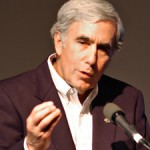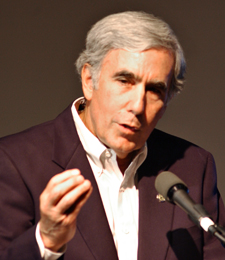Archive for the ‘Nuclear Free Zones’ Category
TFF PressInfo: Nuclear abolition now !
By TFF’s Board
Lund, Sweden August 6, 2014 – Hiroshima Day
The Nuclear Age – risk of omnicide and our new responsibilities
Nuclear weapons came into the world and were used for the first time in 1945. Their specific feature as weapons of mass destruction and “omnicide” – able to kill us all – has changed what it means to be alive on this earth and to be responsible for its existence.
Until nuclear weapons, human beings could not decide whether or not to end project humankind and project planet earth.
Today we know that the arsenals and missile projection methods are such that a few decision-makers, or a technical malfunction, could blow up enough of the world to make the living – if any – envy the dead.
We live in the Nuclear Age. It means living with the permanent daily threat of extinction. Read the rest of this entry »
The mouse that roared
By Gunnar Westberg
The Mouse that roared was a much acclaimed movie comedy from 1955 in which a small European Duchy tried in vain to get the attention of the USA for a trade conflict. To get the attention of the mighty superpower the Duchy finally declared war on the USA. And to its surprise, won!
The story to be told below is less funny.
The Minister of Foreign Affairs for the Marshall Islands, Mr. Tony de Brum, spoke at the recent conference on the treaty against nuclear weapons, NPT, in New York. He remembered his experience of nuclear weapon tests in his childhood:
– “I have witnessed nuclear weapon explosions and my memories from the Lipiep atoll in Northern Marshall Islands are strong. I lived there as a boy during the 12 years of nuclear testing. I remember the blinding white light from the Bravo test on the Bikini atoll in 1954, a thousand times stronger than that over Hiroshima.
The Marshall Islands was used for 67 nuclear tests between 1946 and 1958, with an explosive yield corresponding to 1.6 Hiroshima bombs every day for twelve years. The consequences are still with us as a burden which no nation, no population, should be forced to bear.” Read the rest of this entry »
Marshallöarna utmanar kärnvapenstaterna
Av Gunnar Westberg
Marshallöarnas utrikesminister Tony de Brum berättade vid den pågående förberedelsekommitténs möte (Prep Com) i FNs-högkvarter i New York, den 28 april till 9 maj 2014 om avtalet mot kärnvapen, NPT, i New York, om sina upplevelser av kärnvapenprov:
Jag har varit vittne till kärnvapenexplosioner och mina minnen från Lipiep-atollen i norra Marshallöarna är starka. Jag bodde där som pojke under de 12 åren som kärnvapenproven pågick. Jag minns det bländande vita ljuset från Bravo-sprängningen på Bikini-atollen år 1954, tusen gånger starkare än den över Hiroshima.
Marshallöarna utsattes för 67 kärnvapenprov mellan 1946 och 1958, motsvarande 1,6 Hiroshima-sprängningar varje dag I tolv år. Följderna finns kvar hos oss som en börda som ingen nation, ingen befolkning, skulle behöva bära.
Marshallöarna förvaltades vid tiden för kärnvapensprängningarna av USA under FN-mandat. Nu är landet självständigt med namnet Republiken Marshallöarna, som omfattar ett stort antal öar med en befolkning av totalt endast 60 000 personer. Landet ar ett avtal med USA som bl a innebär att USA står för försvar och vissa sociala tjänster.
Marshallöarna tar nu strid för att inget land i världen skall utsättas för kärnvapen, inte testsprängningar men framför allt inte kärnvapenkrig. Read the rest of this entry »
Nonviolent Geopolitics: Law, Politics, and 21st Century Security*
By Richard Falk
In this short essay, my attempt will be to articulate a conception of a world order premised on nonviolent geopolitics, as well as to consider some obstacles to its realization. By focusing on the interplay of “law” and “geopolitics” the intention is to consider the role played both by normative traditions of law and morality and the “geopolitical” orientation that continue to guide dominant political actors on the global stage.
Such an approach challenges the major premise of realism that security, leadership, stability, and influence in the 21st century continue to rest primarily on military power, or what is sometimes described as “hard power” capabilities. [1]
From such a perspective international law plays a marginal role, useful for challenging the behavior of adversaries, but not to be relied upon in calculating the national interest of one’s own country. As such, the principal contribution of international law, aside from its utility in facilitating cooperation in situations where national interests converge, is to provide rhetoric that rationalizes controversial foreign policy initiatives undertaken by one’s own country and to demonize comparable behavior by an enemy state. This discursive role is not to be minimized, but neither should it be confused with exerting norms of restraint in a consistent and fair manner.
My intention is to do three things:
• to show the degree to which the victors in World War II crafted via the UN Charter essentially a world order, which if behaviorally implemented, would have marginalized war, and encoded by indirection a system of nonviolent geopolitics; in other words, the constitutional and institutional foundations already exist, but inert form;
• to provide a critique of the realist paradigm that never relinquished its hold over the imagination of dominant political elites, and an approach has not acknowledged the obsolescence and dangers associated with the war system;
• and, finally, to consider some trends in international life that make it rational to work toward the embodiment of nonviolent geopolitics in practice and belief, as well as in the formalities of international law. Read the rest of this entry »
60 years of nuclear pain – and not a word in the media
By David Krieger
As the trustee of the United Nations Trust Territory of the Pacific Islands, the United States had an obligation to protect the health and welfare of the Marshallese Islanders. Instead, the U.S. conducted 67 nuclear tests in the Marshall Islands between 1946 and 1958. These 67 nuclear tests had an explosive power equivalent to 1.6 Hiroshima bombs daily for 12 years. In short, the U.S. used these islands shamefully, and the Marshallese people continue to suffer today as a result.
TFF PressInfo: Institute a course for all on what confront humanity in the 21st century
Open Letter to College and University Presidents Re: Global Security 101
By David Krieger
You are in a unique position of leadership to influence today’s youth to achieve a better tomorrow for America and the world. I am writing to enlist your help in educating young people to understand the survival challenges that face humanity in the 21st century.
Education is driven by values. Young people must learn to live with reverence for life, as did Albert Schweitzer, and to support equitable and nonviolent solutions to social problems, as did Gandhi and Martin Luther King, Jr. Young people must be imbued with compassion, commitment and courage. They must learn to use their imaginations to find creative and cooperative solutions to the great issues of our time. And they must find joy in the process and take time to celebrate the miracle of living on the only planet we know of in the universe that supports life. Continue here…
North Korea and the Iran nuclear deal
By Jonathan Power
The agreement just signed by Iran, the US, the EU and Russia is more than a milestone, it changes the world. Perhaps.
It is bitterly opposed by Israel. Prime Minister Benjamin Netanyahu seems determined to be the spoiler. Apparently Israel’s threat to bomb Iran’s nuclear facilities remains a serious option, even though such an attack would only have a limited effect and would provoke Iran to raise the ante against Israel.
But that is not the only worry. There are two other things. Read the rest of this entry »
A tale of two speeches: Rouhani and Netanyahu at UN General Assembly
By Farhang Jahanpour*
With the progress of the talks in Geneva between Iran and the six world powers (the so-called P5+1) on 15 and 16 October, there is growing optimism about a lasting solution to Iran’s nuclear program and to the resumption of relations between Iran and the United States after 34 years of estrangement. After an hour-long power-point presentation by the Iranian Foreign Minister Mohammad Javad Zarif, which he called “closing unnecessary crisis, and opening new horizons”, Michael Mann, the spokesman for EU foreign policy chief Catherine Ashton who is leading the talks for the P5+1 group, described the Iranian proposal as “very useful” and said: “For the first time, very detailed technical discussions took place.” (1)
The exact choice of words was also repeated by a senior US official taking part in the talks. After the formal talks between the two sides, there was another US-Iran bilateral meeting between the chief US representative in the talks, Ms. Wendy Sherman, and Iranian Deputy Foreign Minister Abbas Araqchi who led the Iranian delegation after the Iranian foreign minister’s original presentation. This was the second time after the meeting of Iranian and US foreign ministers in New York that senior officials from the two sides had had a bilateral meeting. Read the rest of this entry »
Soon an accord on Iran’s nuclear program?
By Jonathan Power
Now that Iran and the US have agreed to negotiate over Iran’s nuclear program hopes are rising that a deal can be made that will end the 34 year-long mutual estrangement.
But wait a minute. Before we discuss the possibilities of such a deal coming to fruition there is lurking in the wings a would-be putative saboteur – Israel. At the UN last September Prime Minister Benjamin Netanyahu presented to journalists a caricature of an Iranian nuclear bomb and with a marker pen drew a red line near the top. He made it clear there was a step in the Iranian nuclear program that would be a step too far. The implication was that Israel would make air strikes on Iran’s nuclear facilities, just as it did against Iraq’s Osirak reactor in 1981 and Syria’s in 2007. Netanyahu appears convinced that Iran is on the nuclear bomb route and that President Barack Obama is in danger of being irresponsible.
Israel did not inform the US in advance of the attacks on Osirak or the Syrian reactor. Perhaps, if it feels that the Americans have got it wrong in the present negotiations, it would do the same again. After all, say the Israelis, it is Israel that is the most likely target of an Iranian bomb.
This is ludicrous thinking since Israel could retaliate with its huge stock of nuclear weapons. That is deterrence enough. Read the rest of this entry »
Nukes are nuts !
By David Krieger
Krieger is one of the three TFF Associates nominated for the 2013 Nobel Peace Prize
When asked by a reporter why nuclear weapons are useless, Colin Powell, former US secretary of state and four-star general said: “Because they’re such horrible weapons. And so no sane leader would ever want to cross that line to using nuclear weapons. And, if you are not going to cross that line, then these things are basically useless.” In other words, one could say, nukes are nuts.
There are innumerable global security issues that need to be addressed, some of which are poverty, terrorism, the climate crisis, pollution of the oceans, loss of biodiversity and forest depletion. Not one of these issues can be addressed with nuclear weapons. In fact, nuclear weapons draw much-needed resources away from solving these global problems. Nukes are nuts.
Nuclear weapons are justified by their possessors for nuclear deterrence, but nuclear deterrence is only a hypothesis about human behavior. Read the rest of this entry »





